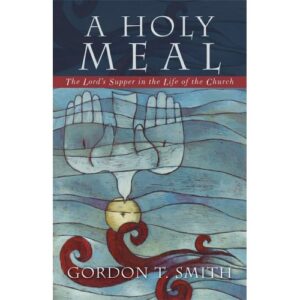
I recently read A Holy Meal: The Lord’s Supper in the Life of the Church by Gordon T. Smith. This books reflects on the Lord’s Supper (or Holy Communion or the Eucharist, depending on your background). The author uses the seven motifs of remembrance, communion, forgiveness, covenant, nourishment, anticipation, and Eucharist to illuminate various truths concerning the Lord’s Supper.
The first couple chapters reflect on the significance of symbols and sacraments in the life of the Church. Gordon Smith artfully compares a symbol to a sign and a photograph. A sign communicates another reality, whereas a photograph reflects meaning.
“What makes a symbol unique and special is that while it points to another reality, as does a sign, it also allows us to participate in the reality, much as with a photograph.”
Gordon Smith points out that ritualistic practices are important, not only for what they symbolize and communicate, but that we as a community practice them together.
“A symbol has even more significance when it comes to communal ritual activity. What makes a ritual a significant symbol is that we participate in it together.”
“Ritual action enables us to be connected not only with the reality symbolized, but also with one another.”
The author goes into explaining the Lord’s supper through seven motifs:
1. Remembrance: The Lords Supper as a Memorial.
2. Communion: The Lord’s Supper as Fellowship with Christ and with one another.
3. Forgiveness: The Lord’s Supper as a Table of Mercy.
4. Covenant: The Lord’s Supper as a Renewal of our Baptismal Vows.
5. Nourishment: The Lord’s Supper as Bread from Heaven.
6. Anticipation: The Lord’s Supper as a Declaration of Hope.
7. Eucharist: The Lord’s Supper as a Joyous Thanksgiving Celebration.
Insights:
I like the way that Gordon Smith goes into the many facets of the Lord’s Super and its significance in the life of the Church. Growing up Catholic, the Eucharist was an important part of the Mass, if not the most important part. As a Catholic when you are receiving Holy Communion you are actually receiving Christ. Although communion was participated with the Church, it was more of an intimate moment between you and God. Although I like some aspects of the personal nature of communion from my Catholic background, I really liked how Gordon Smith explained the significance of Holy communion being a celebration together in the life of the Church, and how this celebration is a declaration of our hope in anticipation of Gods Kingdom to come. The celebration is a celebration of the present in light of the future.
I have often struggled with 1 Corinthians 11:27-29: “Therefore, whoever eats the bread or drinks the cup of the Lord in and unworthy manner will be guilty of sinning against the body and blood of the Lord. A man ought to examine himself before he eats of the bread and drinks of the cup. For anyone who eats and drinks without discerning the body of the Lord eats and drinks judgment on himself.”
This was never a favorite scripture of mine because I viewed the table of God as the table of judgment. I would look at my life and see so many ways which I sinned or violated love. So it was always with fear and trepidation that I approached communion. Gordon Smith helped me to see that Paul wasn’t focusing on individual sins as a concern, but a lack of seeing the body of Christ through a paradigm of mutual fellowship. He says:
“There is no holiness without unity in the body of Christ. The irony is that the very text of Scripture that calls for an appreciation of this unity has been turned on its head and used to cultivate an individualized, often legalistic, perspective on holiness. What makes the observance of the Lord’s Supper unworthy is not so much moral failures as a lack of mutual fellowship and mutual regard. The great danger is that we are not at peace with one another.”
This helped me to see that “eating and drinking” without discerning the body isn’t so much about “personal holiness” as it is about being a “tenacious circle dweller”. Being a tenacious circle dweller means recognizing the body of Christ and being at peace and in unity with one another and not allowing unresolved conflict, prejudices, or unforgiveness to exist, but to work through the issues in order to maintain unity in all my relationships.
Reading this book has opened my eyes to seeing God’s gift of Himself and my brothers and sisters and what it means to partake of this wonderful meal together. God’s table is a table of forgiveness, hope, and redemption; something we participate in “not to get to heaven” but to help us understand a little bit of what “heaven is like”.
I highly recommend this book by Gordon T. Smith.